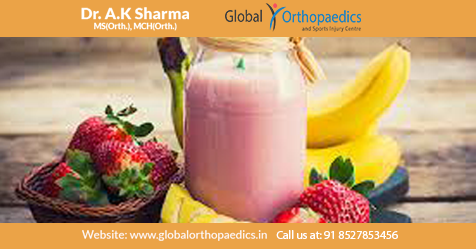There’s an old saying – you are what you eat. But what you drink can have an enormous effect on your body and health too. People don’t put enough thought into what they’re drinking. What you eat and drink is information to your body and if you are drinking well, it can definitely affect how you feel and the messages your body is getting. It is recommended starting every day with a glass of water before you eat any food, since many people wake up a bit dehydrated. The typical recommendation is eight glasses a day. In general, nutritionists advise you to avoid soda since it’s full of sugar, aspartame and phosphoric acid. The latter negatively affects your body’s ability to absorb calcium. But what should you be drinking?

- Tea- Tea is one of the most-studied drinks when it comes to its benefits for arthritis patients. Green, black and white teas are all rich in polyphenols – compounds from plants that have strong anti-inflammatory effects. You’ll find the highest polyphenol levels in green and white teas. Green tea is generally viewed as the most beneficial of all since it’s active ingredient is a polyphenol known as epigallocatechin 3-gallate (EGCG). When it comes to antioxidant activity, EGCG has been shown to be as much as 100 times stronger than vitamins C and E. Studies have shown it also helps preserve cartilage and bone, although there are no widespread controlled trials of it in people with arthritis.
- Coffee- Research shows coffee also has antioxidant polyphenols. That means coffee can help fight free radicals in the body, which cause cell damage. Other research suggests coffee may have a protective effect against gout as well. The jury is still out when it comes to the link between coffee and increased risk of RA or osteoporosis. Some studies say coffee increases the risk, others do not. In general, the best rule of thumb is to drink it in moderation – no more than one or two cups a day.
- Milk- Some say you have to go dairy-free when diagnosed with arthritis, but there’s no research to suggest that’s actually the case. In fact, studies show no difference between RA patients on a dairy-free diet and those who still consume it. Drinking milk may help prevent gout and fight the progression of osteoarthritis. Make sure you opt for low-fat milk to avoid consuming extra calories and saturated fat.
- Juices- Orange, tomato, pineapple and carrot juices are all high in vitamin C, which means they have antioxidant properties, which can neutralize free radicals that lead to inflammation. Tart cherry juice has been shown to protect against gout flares and reduce osteoarthritis symptoms. But be sensible when drinking juice: it’s delicious, but also high in sugar and calories. Check with your doctor if you’re a fan of grapefruit juice, because it can inactivate or alter the effect of many medications.
- Smoothies- One nutritionist after another sings the praises of smoothies over juice. Instead of squeezing the juice of fruits and vegetables, you are putting whole items in – giving you the added bonus of fiber, which helps clean out arteries and fight constipation. Colorful fruits and vegetables are also high in antioxidants. Adding berries or leafy greens like spinach or kale can give you big doses of vitamins and nutrients. Smoothies containing yogurt are full of good bacteria known as probiotics as well as lots of vitamins. Also consider exploring a fermented beverage like kefir as an alternative. It too is full of probiotics that can decrease inflammation in your body. Make sure you’re choosing a low- or no-sugar yogurt or kefir.
- Alcohol- Red wine has a compound in it called resveratrol, which has well-established anti-inflammatory effects. Studies have shown wine consumption is associated with a reduced risk of knee OA, and moderate drinking is also associated with a reduced risk of RA. But many experts question the strength of these studies and argue it’s hard to distinguish confounding factors in this research. Other research shows alcohol’s detrimental effects on arthritis. Overall, everyone agrees there aren’t enough health benefits in alcohol to start drinking if you don’t already do it. But if you do enjoy an occasional adult beverage, “drink it in moderation,” general recommendation is one drink a day (of alcohol) for women, two for men. In excess of that you will lose the benefits and it becomes pro-inflammatory.
- Water- If there’s a magical elixir to drink, it’s water. Hydration is vital for flushing toxins out of your body, which can help fight inflammation. Adequate water can help keep your joints well lubricated and can help prevent gout attacks. Drinking water before a meal can also help you eat less, promoting weight loss.
Experts say don’t bother wasting money on enhanced waters. The added amount of nutrients, electrolytes or antioxidants is generally miniscule.


